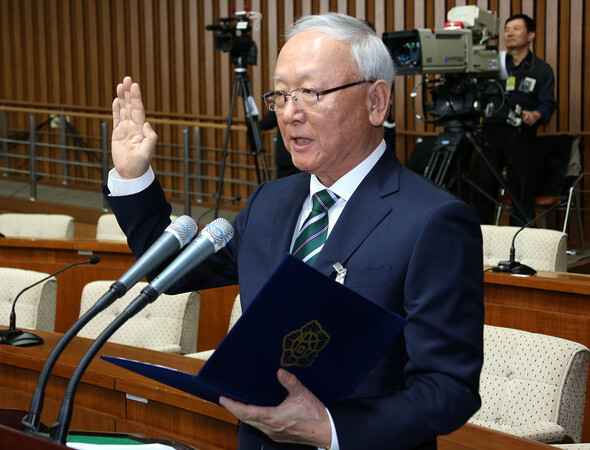hankyoreh
Links to other country sites 다른 나라 사이트 링크
[Reporter’s notebook] Just where does patriotism end for S. Korea’s top officials?

“If there’s a conflict between the interests of the US and this country, I’m only going to think of the Republic of Korea. Why should I think of the US’s interests?”
An unusual question-and-answer exchange took place on Mar. 16 at a hearing for Lee Byung-ho’s nomination to head South Korea’s top intelligence agency. The 75-year-old Lee, who was tapped as director of the National Intelligence Service (NIS), stressed his “confidence that my national view and patriotism will never waver.” But a look at his household is enough to show why someone whose job would put top national secrets in his hands would have to repeatedly affirm his patriotism.
A total of seven family members, including three sons, daughter-in-law, and six grandchildren, either hold citizenship (four) or permanent residency (three) in the United States. This amounts to more than half the 12 members of his family - not including Lee and his wife - who are either US citizens or the closest thing to it.
Some argue that dual nationality shouldn’t be an issue in a global era, and they do have a point. The question is whether there is truly no issue in the case of senior officials whose job requires them to prioritize the national interest. This goes some way in explaining why the Hankyoreh‘s reports on the nationality issue for Lee’s family members was greeted by harsh online criticisms. “He’d be a better fit heading the CIA,” wrote one commenter. “I’d rather have Bruce Willis heading the NIS,” wrote another.
The direction of Lee’s patriotic sympathies has been well established. In 2013, he told a monthly magazine that the Sunshine Policy “dealt a death blow to the NIS’s identity as an intelligence agency,” explaining that “North Korea suddenly went from being a security threat to a ‘partner in engagement.’” The Sunshine Policy was carried out by former Presidents Kim Dae-jung (1998-2003) and Roh Moo-hyun (2003-2008) to provide aid to North Korea and increase inter-Korean cooperation and exchange.
Fears that an ideological lens on security could raise inter-Korean tensions were borne out with the fate of the Park Geun-hye administration’s first NIS director, former military man Nam Jae-joon. Lee later apologized, saying his remarks were “not well considered.” But serious questions remain about what kind of role can be expected as NIS director from someone whose remarks raised inter-Korean tensions while his family members resided overseas.
Lee’s second son and his family live in the US, while his oldest son and his family work or go to school in Hong Kong.
“I’m sure both the US and the Chinese governments are aware of the nationality issue for Mr. Lee’s family members,” said one opposition lawmaker during the hearing. “This is a point of concern.”
Lee did not reply to the remarks.
Regarding the citizenship decisions of his dual-nationality grandchildren, Lee responded, “How is that a matter for parents to decide? It’s their [the grandchildren’s] own decision.”
He went on to say he “intends to encourage them to choose South Korea.” That appears to be exactly where patriotism stops for this country’s top officials.
By Kim Kyu-nam, staff reporter
Please direct questions or comments to [english@hani.co.kr]

Editorial・opinion
![[Guest essay] Amending the Constitution is Yoon’s key to leaving office in public’s good graces [Guest essay] Amending the Constitution is Yoon’s key to leaving office in public’s good graces](https://flexible.img.hani.co.kr/flexible/normal/500/300/imgdb/original/2024/0416/8917132552387962.jpg) [Guest essay] Amending the Constitution is Yoon’s key to leaving office in public’s good graces
[Guest essay] Amending the Constitution is Yoon’s key to leaving office in public’s good graces![[Editorial] 10 years on, lessons of Sewol tragedy must never be forgotten [Editorial] 10 years on, lessons of Sewol tragedy must never be forgotten](https://flexible.img.hani.co.kr/flexible/normal/500/300/imgdb/original/2024/0416/8317132536568958.jpg) [Editorial] 10 years on, lessons of Sewol tragedy must never be forgotten
[Editorial] 10 years on, lessons of Sewol tragedy must never be forgotten- [Column] A death blow to Korea’s prosecutor politics
- [Correspondent’s column] The US and the end of Japanese pacifism
- [Guest essay] How Korea turned its trainee doctors into monsters
- [Guest essay] As someone who helped forge Seoul-Moscow ties, their status today troubles me
- [Editorial] Koreans sent a loud and clear message to Yoon
- [Column] In Korea’s midterm elections, it’s time for accountability
- [Guest essay] At only 26, I’ve seen 4 wars in my home of Gaza
- [Column] Syngman Rhee’s bloody legacy in Jeju
Most viewed articles
- 1[Guest essay] Amending the Constitution is Yoon’s key to leaving office in public’s good graces
- 2Faith in the power of memory: Why these teens carry yellow ribbons for Sewol
- 3[Guest essay] How Korea turned its trainee doctors into monsters
- 4[Editorial] 10 years on, lessons of Sewol tragedy must never be forgotten
- 5Korea ranks among 10 countries going backward on coal power, report shows
- 6Final search of Sewol hull complete, with 5 victims still missing
- 7How Samsung’s promises of cutting-edge tech won US semiconductor grants on par with TSMC
- 8Pres. Park an accomplice in ordering resignation of CJ Group vice chairman
- 9[News analysis] Watershed augmentation of US-Japan alliance to put Korea’s diplomacy to the test
- 10K-pop a major contributor to boom in physical album sales worldwide, says IFPI analyst